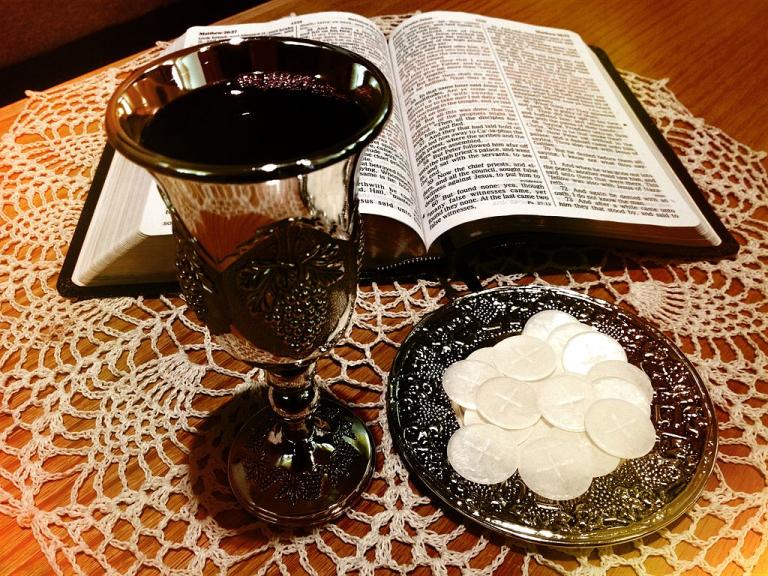Today is Maundy Thursday, when Jesus instituted the sacrament of Holy Communion. Tragically, that has become a contentious issue. Many Christians cannot get their heads around the possibility that Christ is actually present in His Supper.
And yet, Christians acknowledge Christ’s presence, which is a common theme in the New Testament, in other contexts.
Jesus promises His presence with Christians when they worship. “For where two or three are gathered in my name, there am I among them” (Matthew 18:20). I have never heard anyone argue that Jesus is just speaking symbolically. Surely, when Christians gather together, He is actually present.
Evangelicals often speak of Christ’s indwelling presence in the hearts of believers. And they are right to do so, since this is a clear statement of Scripture. “Because I live, you also will live,” says Jesus, referring to His resurrection in a great text for Easter. “In that day you will know that I am in my Father, and you in me, and I in you” (John 14:19-20). You are in me. And I am in you. Isn’t this speaking of a real phenomenon and not just a figure of speech?
To be sure, Christ’s indwelling is a mystery, as St. Paul says: “To them God chose to make known how great among the Gentiles are the riches of the glory of this mystery, which is Christ in you, the hope of glory” (Colossians 1:27).
Then there is the Great Commission, with its climactic promise: “Behold, I am with you always, to the end of the age” (Matthew 28:20). This is just prior to Christ’s Ascension, but I’ve never heard what is commonly said by opponents of Christ’s presence in the Sacrament that after Jesus ascended to His Father, He is in Heaven and no longer on earth, applied to this text. Surely, Christ’s being with us “always, to the end of the age” is a real presence. As St. Paul says of His ascension, because He is at the Father’s “right hand in the heavenly places,” He “fills all in all” (Ephesians 1:20-23).
One of the classic attributes of God is His omnipresence. He can be everywhere without crowding out the presence of His creation. Both the Reformed and the Catholic positions on the Sacrament agree that the bread and wine and the body and blood of Christ must be one or the other, not both. But Lutherans teach that there is a communication of attributes between God the Father and God the Son, as well as God the Holy Spirit. But this too is a Biblical teaching, as St. Paul explicitly states in reference to the indwelling of Christ. Strictly speaking, it is the Holy Spirit who dwells within believers (John 14:17; Romans 8:9; 1 Corinthians 3:16; 2 Timothy 1:14). But because the Holy Spirit dwells within us, the Son dwells within us, as St. Paul says, showing the inter-relationship of the entire Trinity:
For this reason I bow my knees before the Father, from whom every family in heaven and on earth is named, that according to the riches of his glory he may grant you to be strengthened with power through his Spirit in your inner being, so that Christ may dwell in your hearts through faith. (Ephesians 3:17)
So if Christ is present in the Sacrament in the same way that He is present everywhere, wouldn’t that mean that He is just as present in any meal or in any object, so that the Lord’s Supper is not that big a deal after all? No! In the Sacrament, Christ’s body–not His spirit–and His blood are objectively present in a saving way, for the forgiveness of our sins. This happens by virtue of God’s Word, which, along with the elements, constitutes the Sacrament.
As Luther says in the Catechism, “Certainly not just eating and drinking do these things, but the words written here: ‘Given and shed for you for the forgiveness of sins.’ These words, along with the bodily eating and drinking, are the main thing in the Sacrament.”
(See the Formula of Concord, VII, the epitome and the solid declaration.)
At any rate, Christians need to recover the presence of Christ, in all these senses, in order to counter the prevailing assumption about God that He is distant and far away, looking down on us from a great height. This is the legacy of Deism and it is rampant among both those who say they believe in God and those who do not. Rather, God–indeed, the incarnate second person of the Trinity, is close to us. “‘In him we live and move and have our being’” (Acts 17:28). “The word is near you, in your mouth and in your heart” (Romans 10:8). To be sure, we were far removed from God, but not anymore: “But now in Christ Jesus you who once were far off have been brought near by the blood of Christ” (Ephesians 2:13).
Photo by John Snyder, CC BY-SA 3.0 <https://creativecommons.org/licenses/by-sa/3.0>, via Wikimedia Commons














